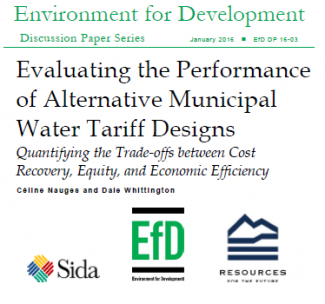FILTER
Displaying 11 - 20 of 65 publications
In Addis Ababa, an increasing block tariff has been used to calculate households’ monthly bills for electricity and water services. This study estimates the magnitudes of the combined water and…
| Discussion Paper | Central America and MexicoThe completion of the Grand Ethiopian Renaissance Dam (GERD) will usher in a new era of complexity in both water management and politics in the Nile Basin. The outcomes that will aterialize for…
| EfD Discussion Paper | EthiopiaThis study evaluates the distribution of electricity subsidies to residential customers in Addis Ababa, Ethiopia in 2016 that results from the current increasing block tariff (IBT) structure. Customer…
| Peer Reviewed | Central America and MexicoA key strategy for adapting to changing water availability and rapid urbanization is a move towards full cost recovery tariffs for water and sanitation services. Because these services are…
| EfD Discussion Paper |Policy makers and utility managers can use a variety of tariff structures to calculate customers’ bills for water and sanitation services, ranging from a simple flat monthly fee to complicated…
| EfD Discussion Paper | KenyaSocial norms comparisons are tools that are being used more and more often by energy and water utilities all over the world in order to induce households to conserve resources. Such conservation…
| EfD Discussion Paper |As the disease burden of poor access to water and sanitation declines around the world, the non-health benefits – mainly the time burden of water collection – will likely grow in importance in sector…
| Peer Reviewed | KenyaStated preference (SP) researchers have encountered an increasing number of policy problems for which a willingness-to-accept (WTA) compensation question would seem to be the most reasonable approach…
| EfD Discussion Paper |The increasing block tariff (IBT) is among the most widely used tariffs by water utilities, particularly in developing countries. This is due in part to the perception that the IBT can effectively…
| Peer Reviewed | KenyaThe design of municipal water tariffs requires balancing multiple criteria such as financial self-sufficiency for the service provider, equity, and economic efficiency for society. A modelling…
| EfD Discussion Paper | KenyaPagination
- First « First
- Prev ‹‹
- 1
- 2
- 3
- 4
- 5
- 6
- 7
- Next ››
- Last Last »

